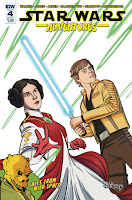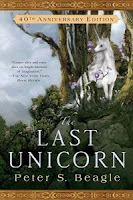Someone on my Facebook feed posted a really interesting article on
Stranger Things and the enduring pop cultural appeal of '80s nostalgia. Unfortunately I can't find it now, but one of the more notable tidbits was the observation that the current wave of '80s nostalgia, which traces back to the late '90s, has now been around almost twice as long as the '80s themselves.
In truth, it's phased in and out, but never gone away. Now, in 2017, it is in full bloom: we've gotten a remake of It, a sequel to
Blade Runner, an '80s themed entry in the Thor movie franchise and, most importantly, a second season of Netflix's unabashedly nostalgic sci-fi horror show,
Stranger Things. Meanwhile, synthwave--the overtly retro '80s music that I make (
shameless plug)--is more popular and visible than ever.
I've long wondered why I'm so attracted to '80s nostalgia, why I've always been attracted to it, but also why I'm so particularly attracted to it now. The simple answer is that I grew up in the '80s, but that's only part of the story. I was a teenager in the '90s, so you might think I'd be nostalgic for that cultural moment. I probably will be at some point, but I'm not right now, not really. So there's clearly more going on there, and I suspect that's the case for most people. What follows is an attempt to make sense of it all, with special reference to
Stranger Things.
An Evolving Aesthetic
In 1997, VH1 debuted what would become its signature program in the post-video age:
Behind the Music. Though not limited to '80s musicians, episodes that featured that decade's more ridiculous figures were instant hits. In 2002, VH1 adapted the British program
I Love the '80s, which surveyed the decade's pop culture landscape a year at a time. (
I Love the 70s and
I Love the 90s followed soon thereafter.)
These programming decisions both reflected and contributed to the wave of nostalgia for '80s pop culture that, according to Simon Reynolds,
cast its shadow over the entire decade. Indeed, if you look at independent music in the early '00s, it's positively drenched in the stuff: from the "punk funk" aesthetics of LCD Soundsystem, Franz Ferdinand and Datarock to the new wave revivalism of Ladytron, Fisherspooner and Scissor Sisters. And it wasn't limited to music either. The cult TV show
Freaks and Geeks (1999-2000) was, in a sense,
the Stranger Things of its day. And
Napoleon Dynamite (2004), though not technically set in the 1980s,
had
a distinctly '80s nostalgic aesthetic. So why does the current round of '80s nostalgia feel different?
In 2005, VH1's Michael Hirschorn
had this to say about the '00s wave of '80s nostalgia:
[It] applies to a specific kind of Gen X, self-mocking, slightly ironic thing. For this group of people, you can't give them straight nostalgia of the sort of baby- boomer, "everything was wonderful and great when we were kids" feel. People Gen X and younger know that things weren't that great. We never thought that Motley Crue was saving the world. We identify with them passionately, but with a certain wink.
The ironic take still holds, to a degree, but it's never been the only thing going. Revivalists from the ''00s, such as Daft Punk and Ariel Pink,
described their approach in decided unironic terms, as less an attempt to recapture a specific sound (with the addition of a wink and a nudge) as to recapture the "blissfully indiscriminate" way in which music was consumed at that time, something that evaporated with the decline of radio and MTV's switch to scripted programming. And if anything, the current wave of retro enthusiasm feels much less ironic and much more earnest than it did in the '00s.
There are plenty of haters, who dismiss the current wave of '80s nostalgia as insipid or emblematic of cultural exhaustion (for example,
here and
here). But I think those people vastly miss the point, namely, that '80s nostalgia in 2017 is purposive, and says more about where we are today than it does about the moment it portrays. And nowhere is that more apparent than in the lost world of Hawkins, Indiana.
The Lost World of Hawkins, Indiana
When I first starting watching
Stranger Things, I was struck by how familiar Hawkins, Indiana felt. I grew up in a place more or less like that, an old Northeastern mill town. It was a twenty minute drive from a small city, and just under an hour from a big one. But it was also a self-contained universe. Most people worked in factories, making calculators, school uniforms or costume jewelry. Others worked in supporting industries--one friend's father owned a small metal treating company, which served the factories. There was a vibrant main street, and a great diner that got so packed on Sundays you could think the whole town was there. There was little crime, and it felt like everyone was looking out for everyone else. It was the kind of place where you knew the police and firefighters by name. The real locals, by which I mean those with roots in the community, probably knew them all from school or little league.
A lot has changed since then. Most of the factories have closed, with the work they once did (and the work that supported them) outsourced to cheaper labor markets. Main Street, like so many across the US, is a dilapidated shadow of its former self. The town as a whole is still okay--its proximity to the aforementioned cities meant it was able to transition from a place that made things to a commuter suburb. And the diner's still there. Many factory towns
have not been so lucky.
But when I see the town of Hawkins, Indiana, it feels like I'm looking back at the place I grew up in, as it once was, but which no longer exists in the same form. This feels important.
Stranger Things isn't just a celebration of pop culture from a previous moment, but a window into a lost world--one where things that have become deeply uncertain are rendered certain again.
The appeal of peeking into this world makes a lot of sense when you consider the political trend, both in the US and globally, toward economic populism. Strikingly, this trend is evident across the political spectrum, though it manifests differently on each end. Both sets of populists want to turn back the clock on several decades of globalization, outsourcing and the financialization of the economy. They just apportion blame differently. Left wing populists are angry over the dissolution of what
George Packer calls "the Roosevelt Republic," a 50-year period of state-regulated economic security and egalitarianism, which was broken up in wake of late '70s stagflation to encourage faster growth, which in turn has disproportionately benefitted the richest of the rich. Right wing populists, by contrast, blame mass immigration for driving down wages and labor unions for driving out the factory owners. Both blame free trade for making it cheaper to build things abroad, though left wing populists also stress its negative effects on emerging markets.
The window to Hawkins shows a place where none of these things have happened yet. Though deregulation was already well underway by 1983 (when season one of
Stranger Things takes place), the effects were not yet evident. We are looking at a place that hasn't experienced the financial crises of 1987, 2000 and 2008 or the cancerous spread of Walmart--a place where economic security and a middle class standard of living are still assumed. I imagine that most people who watch
Stranger Things, regardless of their politics, find this comforting.
Another aspect of Hawkins that strikes me is its whiteness. I don't mean that in strictly racial terms; after all, Lucas is black, as are some other town residents. Rather, I mean it in cultural terms. No one in the town listens to hip-hop, funk or r&b, just rock and country. Aside from this season two's California transplants, no one seems to come from anywhere except Hawkins. There are no immigrants. There doesn't even appear to be a Chinese restaurant.
I also recognize this aspect of Hawkins from my own childhood, when we had to drive to the city for decent Chinese, or to the big city for Thai. That started the change in the '90s, when the area grew more diverse. In 1983, it wasn't very diverse at all. As part of a multilingual household and with an immigrant mother, I was basically the diversity.
This is not something I'm nostalgic for. Even at a young age, I found the hegemony of the monoculture oppressive. The '90s felt like an awakening to the world, with all the promise that entails. I am decidedly not nostalgic for the days when everyone died where they were born.
But I'm sure other people are. In 2016, pundits spoke at length about economic anxieties related to uneven globalization, but
surveys have shown that more people have what you might call cultural anxieties. In extreme form, these manifest as racism, xenophobia and other exclusionary ideas that divide people into categories and then rank them by acceptability. More often, though, it isn't so much about accepting people from other backgrounds as accepting other cultural practices as valid and normal. It is possible, from this view, to accept individual people who
look different as long as they don't
act different. As long as they don't challenge the hegemony of the monoculture.
It would not surprise me to find out that some people are attracted to this element of Hawkins, Indiana, and more specifically, its portrayal of a world before multiculturalism and a time when the myth of strict assimilation still ruled supreme. Hawkins, one could argue, is a utopia for the culturally anxious, a place where the few non-white residents are perfectly comfortable within the monoculture, which in turn makes everyone perfectly comfortable with them. Put another way, Hawkins is exactly what people mean when they use "I don't see color." It means, "I don't want to think about difference."
I don't fault the Duffer Brothers for portraying Hawkins this way. Not everything has to center race, and I appreciate the fact that Lucas is treated as just another kid by everyone in the town. But as I examine my own feelings for this show, and for the place and time it portrays, I have to be honest about what I'm looking at, and how that makes me feel.
Stranger Things is portraying my own lost world accurately, but there are things you lose and wish you could get back, and other things that are better left in the past.
The Lost World of Personhood Beyond Politics
Yet there are plenty of things I do wish we could go back to. Among those, the days when political identities were not so much a defining feature of your personhood as an element of color. Now, politics have always mattered, as have political disagreements. I remember the strong differences of opinion in the '80s: on welfare and taxes, on nuclear weapons and the threat of mutually assured destruction and so forth. But life was not as polarized as it is now. My dad and my friend's dad used to joke on election day that they were canceling out each other's votes. Can you imagine that now--not only saying it, but saying it to a friend
and both of you thinking it's funny?
The shift in attitudes is widespread. As Pew noted in a
2014 report:
The overall share of Americans who express consistently conservative or consistently liberal opinions has doubled over the past two decades from 10% to 21%. And ideological thinking is now much more closely aligned with partisanship than in the past. As a result, ideological overlap between the two parties has diminished: Today, 92% of Republicans are to the right of the median Democrat, and 94% of Democrats are to the left of the median Republican.
Partisan animosity has increased substantially over the same period. In each party, the share with a highly negative view of the opposing party has more than doubled since 1994. Most of these intense partisans believe the opposing party’s policies “are so misguided that they threaten the nation’s well-being.”
The causes of this effect are multiple. Partisan gerrymandering has disincentivized median voter strategies, while unlimited campaign financing means politicians are more beholden to the wishes of individual donors than their districts. Concurrently, the decline of the newspaper and rise of both shrill partisan media and social media all contribute to the emergence of parallel echo chambers, which generate internal solidarity and views of the other as intrinsically threatening. What political polarization has done, then, is transform every political disagreement into a zero sum game, when in past days it might not have been treated as such.
You might be wondering where I'm going with all this; Hawkins, after all, is not a political world. In the series, the only political markers in the town are a solitary Reagan/Bush '84 sign on Mike's yard, as well as his father's bland statement to the men in black, "we're all patriots here." But that's exactly the point. We know very little about anyone's politics--no one even talks about it. So instead we form our opinions on the goodness of people through other means. And that's when it struck me: can you imagine deciding whether you think someone is a good person or not
without knowing their political worldview? This was possible at one time, but it feels weird and alien now.
Some issues bely compromise--of that there can be no doubt. But today it often feels like everyone is fighting everyone on everything, and are so hideously polarized that they can't even think of the other side as equally human. Hawkins provides a comforting antidote to that paradigm, a glimpse back to a moment when people weren't as likely to
other the political other. We don't know who Hopper or Joyce vote for; all we know is that they do right by people.
The Lost World of Childhood
Most strikingly,
Stranger Things captures the freedom accorded to children in days past, and the lack of freedom accorded today.
I'm a parent now, and I'm clear-eyed about of how different it is to raise a child now compared to when I was a kid. Some things have improved--there's much more awareness of bullying, for example, and parents (dads especially) are a lot more involved in day-to-day child rearing than they once were. And, as mentioned above, I see immense value in exposing children to different cultures--something much easier to do now than before, especially if you live in a Hawkins. But I do lament the fact that my kids don't have the freedom I had as a child. The freedom to roam, explore and learn by doing.
Partly that's because I no longer live in a Hawkins. Since college, I've chosen to live in big cities. I've chosen that path on purpose; I find them more stimulating and exciting. But big cities come with crime and traffic, and their populations are transient. There is more to worry about, and fewer people around who you can trust implicitly. It is not possible to simply let your kid roam free at a young age the way you can in a small town. If you did, someone might even
report you to the police.
But it's also cultural--not in the sense of ethnic or religious culture, but the prevalent culture of the moment. The
zeitgeist. In many countries, the US included, the lives of children are increasingly structured. As journalist Hanna Rosin
writes:
I used to puzzle over a particular statistic that routinely comes up in articles about time use: even though women work vastly more hours now than they did in the 1970s, mothers—and fathers—of all income levels spend much more time with their children than they used to. This seemed impossible to me until recently, when I began to think about my own life. My mother didn’t work all that much when I was younger, but she didn’t spend vast amounts of time with me, either. She didn’t arrange my playdates or drive me to swimming lessons or introduce me to cool music she liked. On weekdays after school she just expected me to show up for dinner; on weekends I barely saw her at all. I, on the other hand, might easily spend every waking Saturday hour with one if not all three of my children, taking one to a soccer game, the second to a theater program, the third to a friend’s house, or just hanging out with them at home. When my daughter was about 10, my husband suddenly realized that in her whole life, she had probably not spent more than 10 minutes unsupervised by an adult. Not 10 minutes in 10 years.
It’s hard to absorb how much childhood norms have shifted in just one generation. Actions that would have been considered paranoid in the ’70s—walking third-graders to school, forbidding your kid to play ball in the street, going down the slide with your child in your lap—are now routine. In fact, they are the markers of good, responsible parenting. One very thorough study of “children’s independent mobility,” conducted in urban, suburban, and rural neighborhoods in the U.K., shows that in 1971, 80 percent of third-graders walked to school alone. By 1990, that measure had dropped to 9 percent, and now it’s even lower. When you ask parents why they are more protective than their parents were, they might answer that the world is more dangerous than it was when they were growing up. But this isn’t true, or at least not in the way that we think. For example, parents now routinely tell their children never to talk to strangers, even though all available evidence suggests that children have about the same (very slim) chance of being abducted by a stranger as they did a generation ago. Maybe the real question is, how did these fears come to have such a hold over us? And what have our children lost—and gained—as we’ve succumbed to them?
Rosin presents a theory of how this happened: the largely irrational fear of child abduction, combined with well-intentioned attempts to reduce the risks children face in their daily lives (for example, a largely ineffective campaign to reduce playground accidents). The end result is a safer, though in some ways less stimulating environment. Hawkins, by contrast, is a place where kids still roam free and only go home for meals. In so doing, it shines a light on
all our misgivings with overprotective helicopter parenting in 2017.
You may or may not buy Rosin's argument; I do, at least in the abstract. I see my own childhood in a place like Hawkins and lament that my kids may never experience those endless days spent on bikes, exploring in the woods or climbing around house construction sites. All done as a matter of course, of course--as long as we were home for dinner. But in practice I find it very hard to let go in that way. Clearly, so does Rosin, and I assume this is true for many parents who grew up the way I did but now find the world changed around them. We appreciate the things that have changed for the better, but we mourn the loss of things we once took for granted. And so, we look through the window into the lost world of Hawkins, Indiana, a place we can see but not touch.
Stranger Things exemplifies the purposive dimensions of '80s nostalgia in 2017. But how long can it last? By all rights it shouldn't have lasted this long. Only, rather than fade away, it appears to have metastasized.
The fact is we are no longer locked into pop culture moments the way we once were. Recall that the '80s themselves were nostalgic for both the '50s and '60s, embodied in everything from The Stray Cats to
The Wonder Years.
Stranger Things is, itself, an homage to the way these earlier decades were reinterpreted in the '80s, through the form of the late '50s/early '60s monster movie that's really about fear of communism or McCarthyism. And then there's Steve's haircut:
The genius of the '80s was to mash its nostalgias up with a heady dose of futurism and neon. At a time when the future is scary as shit, the dead futures of past times can be comforting, even when they themselves are reimaginings of even older futures. Meanwhile, the
microgenrefication of music and other entertainment media mean that popular culture can sustain all nostalgias at any given moment. Plus there's the fact that a lot of retro stuff is actually pretty creative.
Synthwave, for example: this isn't '80s music made today, but rather a modern style of music that draws as much on incidental soundtrack and corporate music as it does on pop or indie stuff.
Or compare the pastiche of references in
Stranger Things to those in Ernest Cline's 2011 novel
Ready Player One. The references never overwhelm the narrative in
Stranger Things, nor are they ever made explicit. In other words, if you haven't seen
ET,
Poltergeist or
Aliens, you won't know the winks and nudges are there. Rather, they are window dressing on what is, at its center, a compelling human drama.
Ready Player One, by contrast,
hits you over the head with its unending stream of '80s references--delivered through a series of encyclopedia-style infodumps that are as jarring as they are unsubtle. Now, I realize that
Ready Player One has its legion of fans; but I've tried to read it twice and in found myself unable to suspend disbelief. With
Stranger Things, by contrast, I practically live in Hawkins for each 45 minute episode.
All this is a longwinded way of saying that, while it's possible that '80s nostalgia will recede from popular view, I don't see it going away. Not as long as we still dream of lost worlds.
***
POSTED BY: The G--purveyor of nerdliness, genre fanatic and Nerds of a
Feather founder/administrator, since 2012.
 Rick and Morty #32 - I've been reading this series to fill the old Rick and Morty void until next season, but didn't particularly enjoy this one. Summer embarks on a relationship with a spaceship and a lot of female stereotypes in what felt like a bunch of cheap gags. Written by Pamela Ribon, who also wrote the screenplay for Moana and is co-writing Wreck it Ralph 2, the book lacked that keeps me connected to the television series. I am sure a lot of Rick and Morty fans will enjoy this one, but it wasn't my cup of tea.
Rick and Morty #32 - I've been reading this series to fill the old Rick and Morty void until next season, but didn't particularly enjoy this one. Summer embarks on a relationship with a spaceship and a lot of female stereotypes in what felt like a bunch of cheap gags. Written by Pamela Ribon, who also wrote the screenplay for Moana and is co-writing Wreck it Ralph 2, the book lacked that keeps me connected to the television series. I am sure a lot of Rick and Morty fans will enjoy this one, but it wasn't my cup of tea.






































